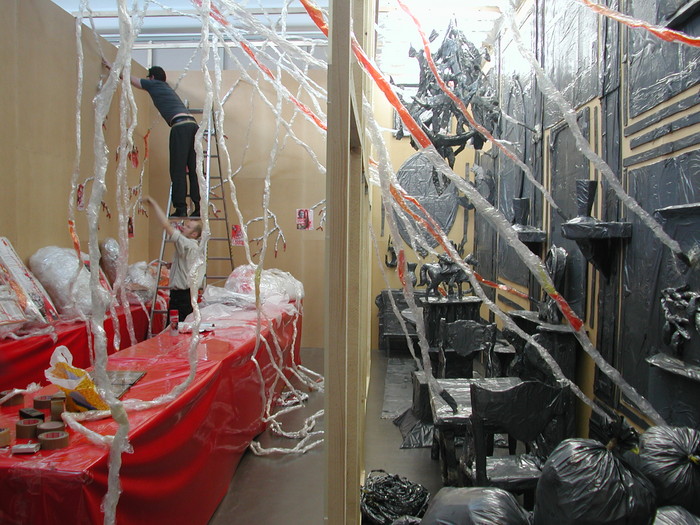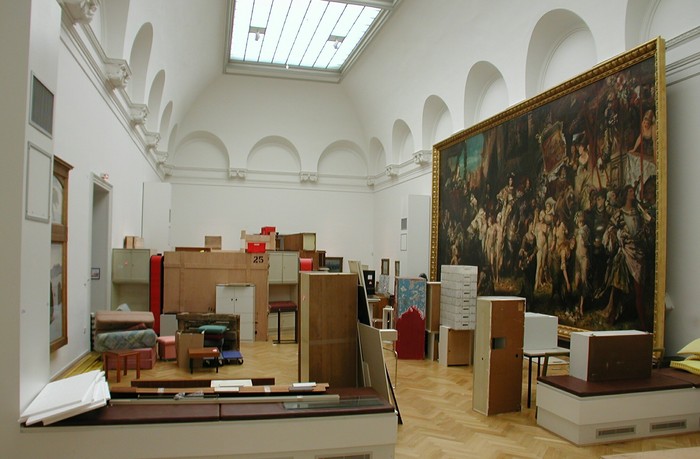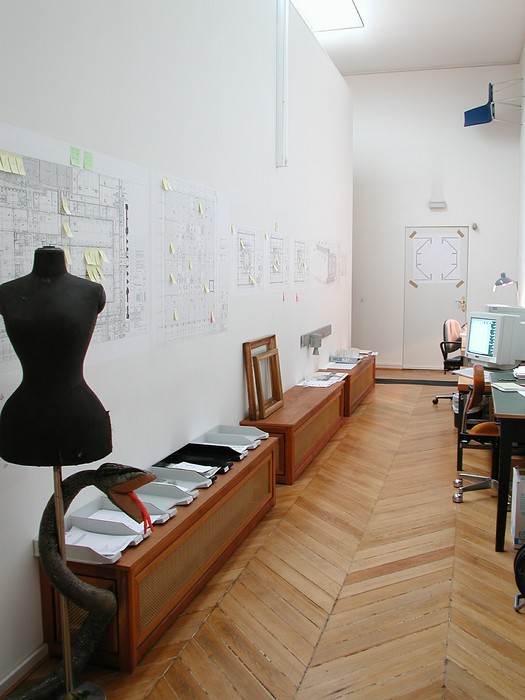MOVING|IN (EIN|RÄUMEN) MUSEUM WORKS (ARBEITEN IM MUSEUM)



Fritz Balthaus Achim Bitter Marcel Broodthaers Angela Bulloch Dellbrügge & de Moll Jürgen Drescher Marcel Duchamp Bogomir Ecker Maria Eichhorn Robert Filliou Fluxhouse Cooperative Claus Föttinger Food Andrea Fraser Peter Friedl Dan Graham Sabine Groß Christine Hill Thomas Hirschhorn Jenny Holzer Carsten Höller Sabine Hornig Franka Hörnschemeyer Stephan von Huene Ingold Airlines Ilya Kabakov Gabriele Konsor Louise Lawler Jozef Legrand Bernhard Martin Christine Meierhofer Gerhard Merz Piotr Nathan NoRoom Gallery Claes Oldenburg Blinky Palermo Jorge Pardo Manfred Pernice Ralf Peters Nana Petzet Hans-Peter Porzner p. t. t. red Christoph Rauch/Attitla Menesi Tobias Rehberger Gerd Rohling Eric Satie Barbara/Gabriele Schmidt-Heins Gregor Schneider Richard Serra Sery C. Andreas Slominski Florian Slotawa Annette Streyl Nicola Torke Rirkrit Tiravanija Ben Vautier Andreas Wegner Susanne Weirich Simone Westerwinter Stephen Willats Wolfgang Winter/Berthold Hörbelt Heimo Zobernig
As we bid farewell to the 20th century, the question as to what art is and what it could be not only determines contemporary artistic production but also influences the working practices of the institutions involved with the collection, study, assessment and presentation of art.
The exhibition moving|in MUSEUM WORKS is an attempt to explore the current situation, responding to a fundamental change in the approach to art in the 20th century. Over the past decades many artists have become less interested in the differentiation of traditional art forms, and more in the possibilities remaining open to art. Increasingly this has involved reflecting on the art business itself, above all on the museum as an institution. Artists have begun to examine the practices and processes of the art exhibition business, to intervene in these processes and to investigate new areas of artistic activity.
Ever since Marcel Duchamp rejected retinal art, pushing back the boundaries of the art discourse with his notion of the “readymade”, it has been common artistic practice to consider the subsystem of art as a factor of political and social reality. Over the past decades many artists have abandoned the production of art objects in favour of an exploration of the contextual nature of art.
The starting point for moving|in MUSEUM WORKS is provided by the pioneers of this critical approach to institutions, artists who have already gained entry into the collection of the Hamburg Kunsthalle. Moving|in MUSEUM WORKS pays them their due respect. Works by Marcel Duchamp, Robert Filliou, George Maciunas, Claes Oldenburg, Ben Vautier, Gordon Matta-Clark and Blinky Palermo reflect artistic approaches which have long-since become recognized historical positions of critical intervention.
Moving|in MUSEUM WORKS looks back on a century of work by these critics of the art system while at the same time opening a window onto current artistic discourse. Contemporary artists have been invited to respond to the Hamburg Kunsthalle‘s actual museum practice. At their disposal is a 12000 m2 area of public space: the three buildings which form the museum complex with all its associated historic references and current functions.
Moving|in MUSEUM WORKS goes against what is now common museum practice: to show special exhibitions separately from the museum collection. It turns the museum with its diverse fields of activity into a place of discourse, taking a critical approach to the implicit rules of the institution of art and, by association, to museum reality, since the working practice of a museum is determined not only by art-historical research but also by its legal framework, political interests, financial possibilities and staffing levels.
At issue are therefore not only the four functional pillars of the museum business: collection, preservation, study and mediation, but also all other aspects of museum work: questions of ownership and terms of acquisition, worthiness for collection and exclusion, archives and inventory, modes of classification and cataloguing, canon and the formation of distinction, conservation and security, finance and administration, building structure and legal form, principles of construction and deconstruction.
In moving|in MUSEUM WORKS the implicit rules of the art exhibition trade are analysed in an attempt to sound out new areas of artistic activity. The question as to what art is today can be answered only in a very immediate and concrete way: in the form of an artistic response to the given institutional framework of possibilities. In this exhibition artists are in a position to confront the existing, historically occupied space of the museum with its current usage and practice, and through their actions try out new spheres of activity. The question as to the conditional framework of possibilities for art is therefore dealt with not in a general sense, but rather in a quite concrete manner.
The relationship between artistic and art historical practice is therefore one of mutual reference and reciprocity, combining to expand the horizons of theoretical and practical museum work. What art is and what it can be is after all not just a question of institutional rule-making, but also of the interpretation of these rules.
Moving|in MUSEUM WORKS enters into this experiment involving a wider form of museum practice. In close co-operation between participating artists and museum staff, problematic areas will be discussed and contextual relevance elaborated through dialogue, with the development of the project itself being conceived as a process.
60 current projects in the Hamburg Kunsthalle (curated by Frank Barth)
20 October 2000 till 21 January 2001
